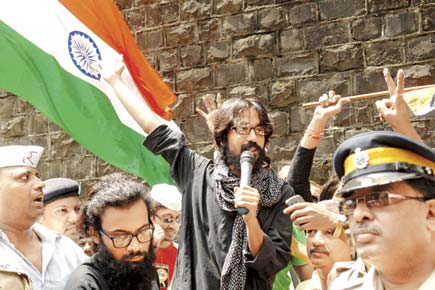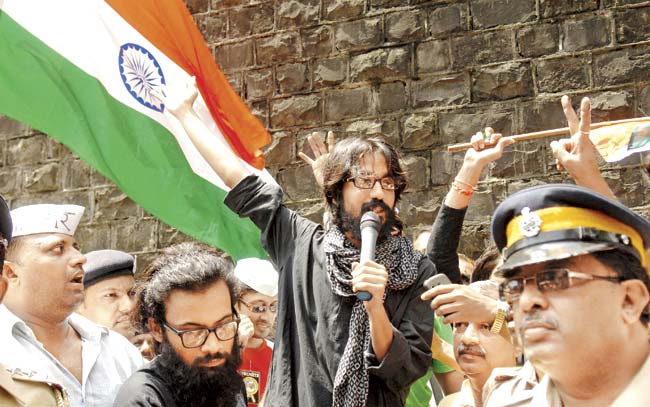Remember those two teenage girls who were arrested for criticising the bandh after Bal Thackeray’s death on Facebook? Or the cartoonist who got arrested for lampooning Parliament?

 Remember those two teenage girls who were arrested for criticising the bandh after Bal Thackeray’s death on Facebook? Or the cartoonist who got arrested for lampooning Parliament? Or the professor who was thrown in jail for caricaturing West Bengal’s Chief Minister Mamata Banerjee? They were all arrested under the controversial Section 66A of the Information Technology Act (2000). The spate of arrests under that section led to a directive restricting its indiscriminate use in 2013.
Remember those two teenage girls who were arrested for criticising the bandh after Bal Thackeray’s death on Facebook? Or the cartoonist who got arrested for lampooning Parliament? Or the professor who was thrown in jail for caricaturing West Bengal’s Chief Minister Mamata Banerjee? They were all arrested under the controversial Section 66A of the Information Technology Act (2000). The spate of arrests under that section led to a directive restricting its indiscriminate use in 2013.

In 2012, cartoonist Aseem Trivedi was arrested under sedition charges as well as Section 66A of the Information Technology Act for his controversial cartoons lampooning the Parliament and Constitution. File pic
ADVERTISEMENT
Now it looks like Section 66A might lose its bite. On Tuesday, the Supreme Court of India observed that “Section 66A does not give any specific guidance on when to invoke it, unlike the provisions in the Indian Penal Code (IPC). It appears that nobody has to even say anything hateful or meaning ill will... annoyance of someone could be used to invoke it,” said a bench of Justices J Chelameswar and S A Bobde. The Centre too acknowledged that the Section was prone to abuse. It criminalises the sending, through a computer device, messages that are “offensive or false or created for the purpose of causing annoyance or inconvenience, danger, obstruction, insult, injury, criminal intimidation, enmity, hatred or ill-will.” This vague wording leaves scope for arbitrary arrests like the ones mentioned above.
As long as it stays, Section 66A is a threat to free speech. It means that you and I can be arrested for speaking our minds. If the Section is watered down or scrapped, it would be good news for anyone who believes free speech is an axiom in a democracy.
But here is the flipside. Does speaking our mind mean rude, offensive and crude behaviour? Social media has made life so much fun because you can chat with friends on WhatsApp or Facebook, keep track of them, share pictures or videos, follow your personal or professional interests on Twitter and do dozens of other things that were impossible just ten years back. It has made both information and two-way communication faster and easier and certainly more interesting.
But it has also released stream-of-consciousness kind of conversations that are, many times, hurtful or plain venomous. It is routine for celebrities to face the threat of rape, dirty pictures and verbal abuse. One really mean comment under pictures of Priyanka Chopra standing with folded hands to greet people coming to mourn her father’s death, said she was posing to show the tattoo on her wrist which read “Daddy’s lil girl”.
When the son and granddaughter of two of India’s biggest film stars had reportedly been taped while making out, I saw several mothers of teenagers happily passing that clip to one other. How would they feel if clips of their teenagers making out with someone were passed along? What about the fact that those star kids were minors and therefore forwarding that clip was probably criminal. All that mattered was the feeling of “show me”.
For all the riches it offers, social media brings out the worst in humanity. It offers instant gratification to communicate every feeling. And most people indulge in this without a thought to right or wrong, without checking facts, without bothering about the harm they may cause. The result of this instant gratification, indulged in by millions of people at the same time, results in some of the muck that you see online.
When I asked a lawyer friend whether it was anonymity or the nature of the web that encouraged bad behaviour, he pointed to the US. Everyone from Jennifer Lawrence and Monica Lewinsky have been targeted with dirty pictures and verbal abuse. It seems then that almost everyone loves the chance to flash their worst sides online.
If, as citizens, we celebrate the fact that Supreme Court has stood up for our freedom of speech; maybe it is time to start a debate on the responsibilities that go with that freedom for each one of us.
The writer is a media specialist and author. Follow her on twitter at https://twitter.com/vanitakohlik
 Subscribe today by clicking the link and stay updated with the latest news!" Click here!
Subscribe today by clicking the link and stay updated with the latest news!" Click here!







